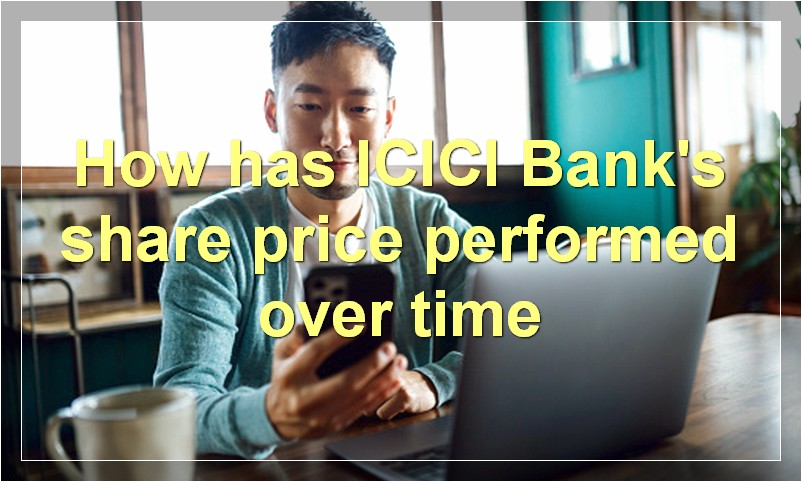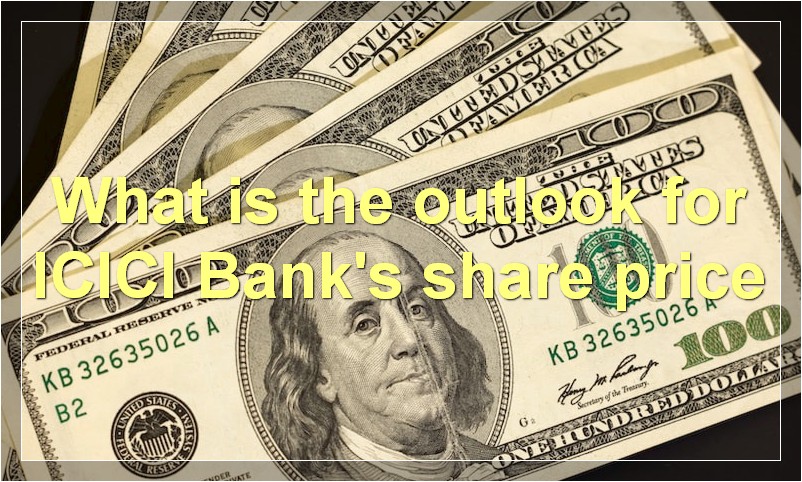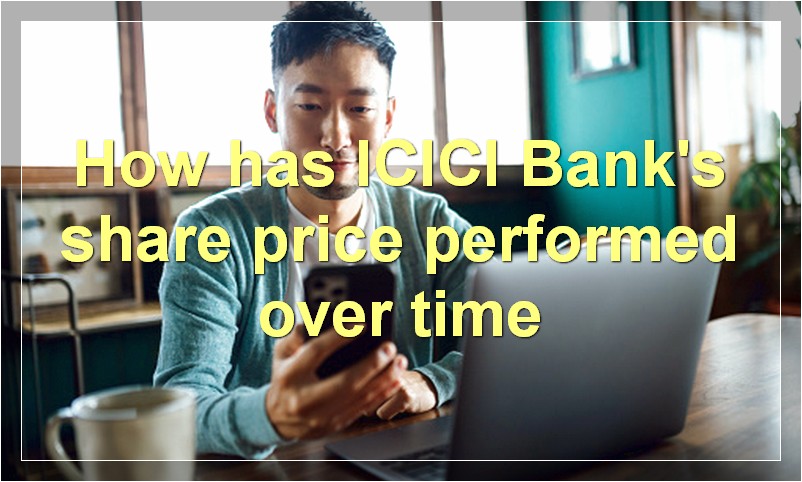If you’re looking to invest in ICICI Bank, then you need to know about their share price. Here’s everything you need to know.
What is the current price of ICICI Bank shares
ICICI Bank shares are currently trading at Rs. 405.15 on the BSE, up 1.21% from the previous close. The stock has hit an intraday high of Rs. 406.85 and an intraday low of Rs. 402.65.
ICICI Bank is one of the largest private sector banks in India with over 4,850 branches and 14,000 ATMs spread across the country. The bank offers a wide range of banking products and financial services to corporate and retail customers through its three business segments – Retail Banking, Wholesale Banking, and Treasury.
ICICI Bank shares have been on a roll in recent times, thanks to the strong performance of the bank in FY17. The stock hit an all-time high of Rs. 411.80 on February 21, 2017 and has gained over 19% in the last one year.
How has ICICI Bank’s share price performed over time

ICICI Bank’s share price has been on a steady rise over the past few years. In fact, since 2013, the stock has nearly doubled in value. This is thanks to the bank’s strong financial performance and positive outlook.
Investors have been drawn to ICICI Bank for its strong growth prospects. The bank has been aggressively expanding its operations in recent years, and this is expected to continue. This is particularly true in rural areas, where ICICI Bank has been able to gain market share.
The other reason investors have been bullish on ICICI Bank is its solid financial performance. The bank reported strong profits in the last fiscal year, and this is expected to continue in the current year. Moreover, the bank’s bad loan ratio is improving, which is another positive sign.
Overall, there are many reasons to be bullish on ICICI Bank. The stock has performed well in recent years and is expected to continue to do so.
What factors influence ICICI Bank’s share price
There are a number of factors that can influence ICICI Bank’s share price. These include economic indicators such as GDP growth, inflation and interest rates; political factors such as government policy and regulation; and sector-specific factors such as the performance of the banking sector as a whole.
In the short term, share prices are often influenced by company-specific news. This can include everything from financial results and analyst ratings to rumours and speculation. In the long term, however, it is the underlying fundamentals of the business that will ultimately determine the share price.
The Indian economy is a major factor influencing ICICI Bank’s share price. India is one of the fastest-growing economies in the world, and this has been a major driver of ICICI Bank’s share price over the last few years. However, India is also a very volatile market, and this can lead to sharp movements in the share price in response to changes in economic conditions.
The banking sector is another important factor affecting ICICI Bank’s share price. The sector as a whole has been under pressure in recent years due to low interest rates and increased regulation. This has led to profitability being squeezed for banks across the world, and this has had an impact on ICICI Bank’s share price.
Finally, political factors can also have an influence on ICICI Bank’s share price. India is currently going through a period of significant political change, with a new government elected in 2019. The new government has promised to bring about radical economic reform, and this could have a positive or negative impact on ICICI Bank’s business depending on how it is implemented.
How do ICICI Bank’s shares compare to its competitors
In order to compare ICICI Bank’s shares to its competitors, one must first understand the different types of banks and their share structures. ICICI Bank is a universal bank, which offers both traditional banking products and services as well as investment banking products and services. Its main competitors in India are HDFC Bank, Axis Bank, and Kotak Mahindra Bank. All three of these banks are also universal banks.
When comparing the share structures of these banks, it is important to note that ICICI Bank has a higher percentage of shares held by foreign institutional investors than its competitors. As of March 2020, foreign institutional investors held approximately 24% of ICICI Bank’s shares, compared to 17% for HDFC Bank, 14% for Axis Bank, and 11% for Kotak Mahindra Bank.
This higher percentage of shares held by foreign institutional investors indicates that ICICI Bank is more popular with these investors than its competitors. This could be due to a variety of factors, such as the bank’s strong financial performance, its experienced management team, or its diversified business model.
Is now a good time to buy ICICI Bank shares
If you’re considering investing in ICICI Bank shares, now may be a good time to act. The bank’s stock has been on the rise in recent months, hitting a 52-week high in November.
There are several factors that could be driving ICICI Bank’s share price upward. First, the bank reported strong earnings for its fiscal third quarter, which ended in September. Net profit rose 22% year over year, while operating income and net interest income both increased by healthy double-digit percentages.
Second, ICICI Bank has been working to improve its asset quality. In October, the bank announced that it had reached a settlement with the Reserve Bank of India (RBI) over a dispute related to non-performing loans. This should help to reduce the amount of bad loans on ICICI Bank’s balance sheet and improve profitability going forward.
Finally, investors may be bullish on ICICI Bank shares because of the potential for growth in the Indian economy. The country’s central bank recently cut interest rates, which could spur more lending and economic activity. And with Prime Minister Narendra Modi’s “Make in India” initiative gaining momentum, there could be more opportunities for ICICI Bank to expand its business.
Overall, then, there are several reasons why ICICI Bank shares could continue to rise in value. If you’re thinking about buying shares, now may be a good time to do so.
What is the outlook for ICICI Bank’s share price

The outlook for ICICI Bank’s share price is positive. The bank has strong fundamentals and a strong management team. The share price is expected to continue to rise in the future.
What is the dividend yield on ICICI Bank shares
The dividend yield on ICICI Bank shares is a measure of the company’s profitability and is an important indicator for investors. It represents the percentage of the company’s annual profits that are paid out to shareholders in the form of dividends. The higher the dividend yield, the more profitable the company is and the more attractive it is to investors. ICICI Bank has a dividend yield of 3.5%, which means that for every Rs 100 you invest in the company, you will receive Rs 3.50 in dividends each year. This is a relatively high dividend yield, which indicates that ICICI Bank is a very profitable company and is an attractive investment opportunity.
How much debt does ICICI Bank have
ICICI Bank is one of the leading banks in India with a strong presence in both retail and corporate banking. As of September 2020, the bank’s gross non-performing assets (NPA) stood at Rs. 53,542 crore (US$ 7.4 billion), while its net NPA was at Rs. 26,816 crore (US$ 3.6 billion). The bank’s provision coverage ratio was at 67.48%.
In March 2020, ICICI Bank had reported a standalone profit after tax of Rs. 4,146 crore (US$ 561 million) for the quarter ended December 2019. However, for the full year 2019-20, the bank reported a loss of Rs. 2,599 crore (US$ 351 million). This was primarily due to higher provisions made towards bad loans.
What is ICICI Bank’s market capitalization
ICICI Bank is a leading private sector bank in India with an asset base of over Rs. 3 trillion and a market capitalization of over Rs. 1 trillion as of March 31, 2019. The Bank has a network of 5,275 branches and 15,589 ATMs spread across the country.
What analyst recommendations are there for ICICI Bank shares
The analysts have a buy rating on the stock with a target price of Rs 700. They believe that the bank’s strong performance in the past quarter is a sign of things to come and that the stock is a good long-term investment.

